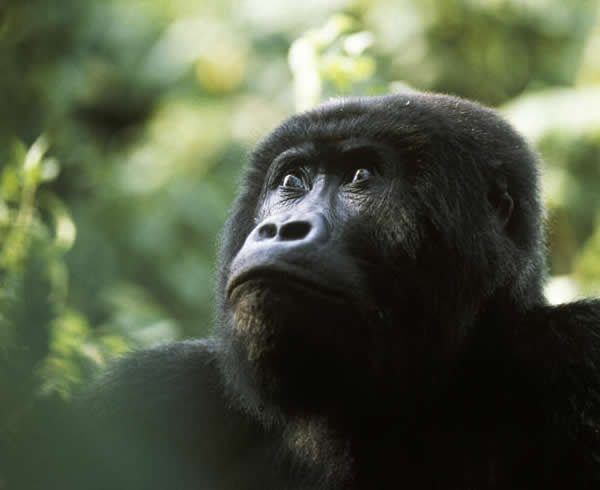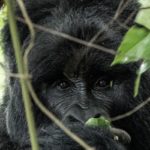Cost of gorilla trekking in Rwanda– Primate Safaris
Such a high price for the permits makes the adventure of trekking the gorillas to be the most expensive safari holiday experience in Africa. Many travelers have taken part in this amazing life-changing encounter with the gorillas while others continue to plan their gorilla tours for the nearing future. What is interesting about the gorilla permit fees is that you can pay this money throughout the year regardless of the season. To trek the gorillas in Rwanda, the permit fees remains the same for both nationals and non-nationals.
Price for Gorilla trekking Permit
Gorilla trekking is undoubtedly one of the most expensive activities in Rwanda. The cost of a gorilla trekking permit is very expensive but truly worth it. In Rwanda, a gorilla trekking permit costs US$ 1500. Mountain gorillas are only found in the three African countries which are Uganda, Rwanda, and Congo. Rwanda sells the most expensive gorilla permits of all the countries.
When talking to one of the authorities of wildlife conversations at Rwanda Development Board, we were highlighted about some of the reasons why gorilla trekking is so expensive. The reasons among others include;
- The Mountain Gorillas are highly endangered
One of the top reasons as to why gorilla trekking is so expensive in Rwanda is that the gorillas are highly endangered and therefore requires the authorities to reduce their interaction with big crowds of people. According to recent statistics as of 2016, it is estimated that only 900 mountain gorillas are remaining in the whole world surviving in the tropical rain forests of Bwindi forest national park and Mgahinga gorilla national park in Uganda, Volcanoes national park in Rwanda and Virunga national park in the Democratic Republic of Congo. Therefore, this calls for a high cost of the gorilla permits to perhaps discourage some people from traveling hence saving the highly endangered species from the crowds.
- Mountain Gorillas Susceptible to Human Diseases
Another reason perhaps is that the mountain gorillas are close relatives to human beings which make them vulnerable to being infected by human diseases. This means, to save the mountain gorillas from being overcrowded by many humans, the permits have to be put on a high so as to limit some people from trekking them and also to avoid over exploitation and exceeding the carrying capacity of gorilla national park, which is Volcanoes National Park.
- The need to conserve and offer sustainable gorilla tourism
After experiencing a great loss of mountain gorillas in the 1980s due to poaching and human encroachment on the mountain gorilla habitats.
The authorities decided to increase the gorilla permits in both countries so as to accrue revenue which can then be used to conserve the gorilla habitats and also to promote a sustainable gorilla tourism environment. This tells why Rwanda, for example, doubled the gorilla permit fee from $750.00 USD in 2017 to $1500.00 USD aiming to conserve the shrinking habitat of mountain gorillas.
To the Wildlife Authorities Conserving the gorillas, this is an indirect way of promoting sustainable gorilla tourism in Rwanda. Imagine if there was no limit on the number of travelers allowed to trek mountain gorillas? There would be crowding and overstepping which destroy gorilla habitats. A high number of travelers also make mountain gorillas uncomfortable in their natural habitat, which destructs their social happy life.
- Safety and Easy Monitoring
Being that the mountain gorillas are highly endangered species, it is necessary to continuously monitor them so as to ensure they are safe which may not be possible if too many people are allowed to visit their habitats. According to the authorities, the funds collected from selling gorilla permits are partially used remunerate the ranger guides who monitor the well being of mountain gorillas in their habitats such as tracking their movements, feeding, and health status.
Tourism police and other armed rangers have also been hired to ensure the safety of mountain gorillas from any external attack by the poachers, and rebel groups who in the past used the gorilla habits as their hiding places. Incase travelers are connecting from one destination to another at night, tourism police escort them which ensures their safety throughout.
- Gorilla Trekking is one way of improving the livelihood of the locals
Gorilla tourism has become an indirect source of Local livelihood for the communities adjacent to gorilla national parks. Responsible governments share part of the revenue earned to local communities to improve their standards of living. Rwanda gives 10% to local people.
Sharing with local people has created a positive attitude of local people towards gorilla tourism and conservation hence reducing the natural resource conflicts between local people and the management of respective national parks. Before the introduction of gorilla tourism and wildlife conservation, local people had full access to all resources in the forest.
- Monopoly
Scarcity is one of the foundational principles in economics, whenever resources are scarce; there is always a high demand for the product which leads to inflated prices as well.
Mountain Gorilla tracking is not an exception; it cannot be carried out anywhere else in the whole world apart from these three countries. This implies that you only have limited options in case you are considering tracking mountain gorillas.
Rwanda; is more of luxurious gorilla trekking destination and gorilla trekking safaris; unfortunately due to insecurity and Ebola threats, Democratic republic of Congo is still facing stiff competition from Uganda and Rwanda.
Until Democratic republic of Congo gets back on the competition scene, the permits will still be charged expensively due to the only two secure destinations.
Conclusion
However you cannot consider booking the activity as a group to reduce the expenditure. This might not apply for gorilla trekking in Rwanda.


